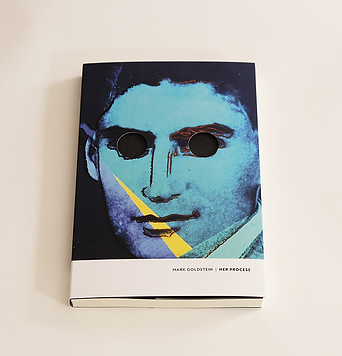
I am a writer, editor, translator and graphic artist whose poetry and criticism have appeared in both trade and limited editions as well as in periodicals and journals such as The Capilano Review, Periodicities and Jacket2.
I have facilitated workshops at, among others, the Toronto New School of Writing, SUNY Albany, and guest lectured on translation at George Brown College, York University, and in Paris at the École des hautes études en sciences socials.

Thricelandium extends outward as it engages with the poetry of Paul Celan, Holocaust survivor and German-language poet.
Atemkristall, Eingedunkelt, and Schwarzmaut are poem-cycles published together for the first time in their original German alongside Mark Goldstein’s English translations en face.
In his introduction, an essay on translating Celan, and extensive notes on the poems, Goldstein posits that these works form a triptych documenting Celan’s psychic battles during the final decade of his life. A reaffirmation, a capitulation and, finally, a resignation.
This book is a cogent addition to the body of work forming the central statement on Celan’s poetry in English translation.

“I believe that Goldstein has done something important and revivifying that honours both the female experience and Kafka.” – Phil Hall
Her Process is a transtranslation of the seminal Muir edition of Franz Kafka's The Trial. In it, the gender of the protagonist is reconceived and hence “Someone must have named Josephine Kay, for without having done anything wrong, one fine morning, she was arrested.”
Her Process is the companion work to Part Thief, Part Carpenter, a book-length collection of poetry, essays, and interviews on appropriation and transtranslation.

Part Thief, Part Carpenter contains poetry, essays and interviews that focus on appropriation and transtranslation. Chapters include writings on The New Minstrelsy, Uncreative Writing, The New Sentence, Erasure, and Oulipo. There is also an in-depth look at the postmodern poetics of Charles Reznikoff’s masterwork, Holocaust, as well as an exploration of the poetry of Paul Celan in English translation. At 248 pages, Part Thief, Part Carpenter is a richly varied read through the landscapes of contemporary poetry.
Part Thief, Part Carpenter is the companion work to Her Process, a gender bending transtranslation of Franz Kafka's The Trial.

“Stretching out into poem-sections – ‘Creation,’ ‘Preservation,’ ‘Destruction’ and ‘Quiescence’ – Goldstein’s Form of Forms is highly charged, and the poem composes its own breakdown before attempting to re-assemble, through both form and content. ‘Mark Goldstein,’ we learn, is adopted, and attempting to reconcile exactly what that might mean for who he is, who he was, and possibly, who he might have been.”
– rob mclennan
A “best of” pick of 2012 poetry books by rob mclennan
2013 Alcuin Society winner for Excellence in Book Design
2014 Leipzig Prize finalist · Best International Book Design

“Things turn up in Goldstein’s work – the angst that is at the heart of Celan’s writing for example – that comes across very different [...] than it would playing ‘test of translation’ against Joris. And there is a sense of the source (or Ur-) text as other in Goldstein that is palpable....” – Ron Silliman
Tracelanguage is a serial poem made up of six cycles all of which correspond with Paul Celan’s 1967 book of poetry, Atemwende. Here, his work is re-inscribed via a transmutation of word material found or developed from within the original text. These poems are elegiac in nature. A language of landscape figures prominently in the work, one where the "trace" of Tracelanguage gauges Celan’s music amid the rubble of its German, post Shoa.

“I’m not sure what game Goldstein is playing with these Rilke translations – are they homophonic, or perhaps Oulipo-inspired versions of Rilke originals – but in the letters he has the Spicer voice down pat [...]. Phil Hall’s blurb avers that ‘The author is soaking German for its English,’ and I like that verb, with its suggestion of a long, perhaps fatal immersion. A note from the author (‘the author,’ hard to say now with a straight face, after reading this work in which authorship is so challenged and laughed at) says that he was inspired by bpNichol’s ‘whimsical translations of both Catullus and Apollinaire,’ and afterwards Zukofsky’s Catullus proved a decisive stroke. [...] a surprising lightness and felicity animates the actual poems & letters that comprise this arresting collection, & it helps to read it aloud.” – Kevin Killian